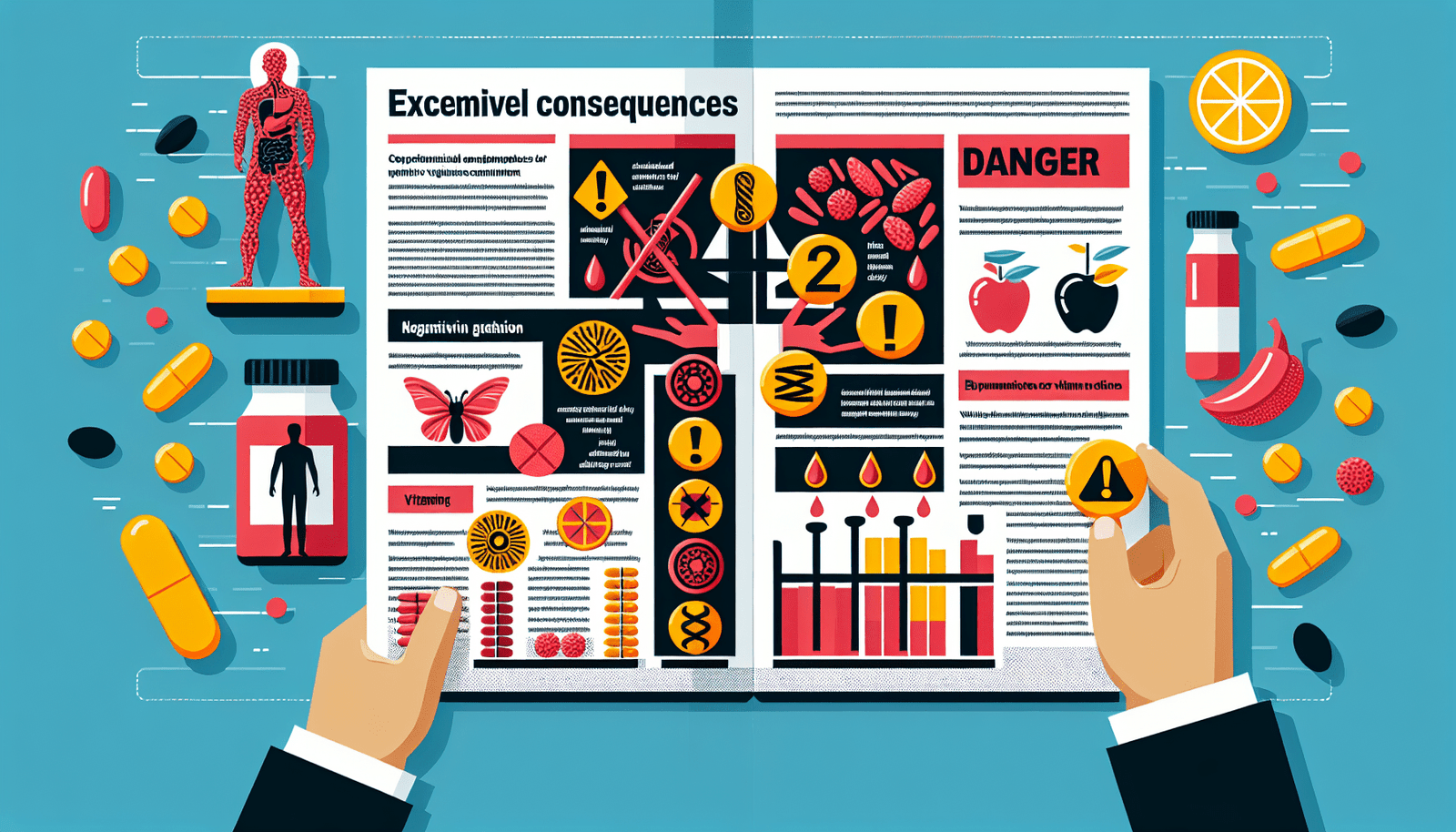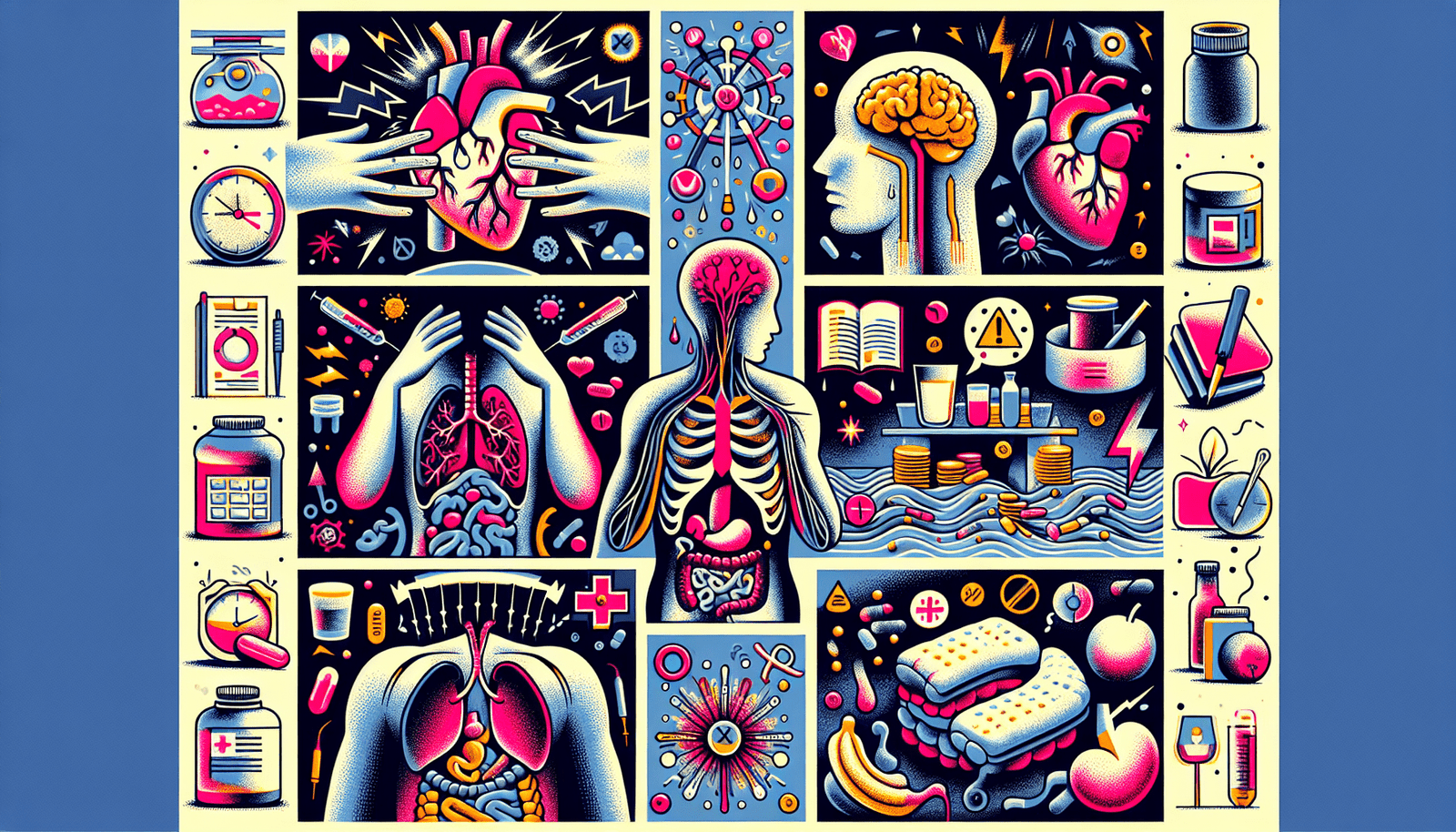Have you ever wondered about the potential consequences of consuming excessive amounts of vitamins? We often associate vitamins with good health and well-being, but it’s essential to understand that too much of a good thing can sometimes have detrimental effects. In this article, we will explore the potential risks and side effects that can arise from overconsumption of vitamins, shedding light on the importance of balance in our daily nutrient intake. So, let’s unravel the potential pitfalls of excessive vitamin consumption and ensure a healthier and more informed approach to our dietary choices.
General Overview
Definition of vitamins
Vitamins are essential organic compounds that our bodies need in small amounts to function properly. They play a crucial role in maintaining good health and are necessary for various bodily functions. There are 13 different vitamins that can be classified into two categories: fat-soluble vitamins and water-soluble vitamins.
Importance of vitamins for the body
Vitamins are vital for the body as they help with numerous functions, including supporting the immune system, promoting growth and development, facilitating energy production, assisting in the formation of red blood cells, and maintaining healthy bones and tissues. They act as catalysts for many chemical reactions in the body and are necessary for the metabolism of carbohydrates, proteins, and fats.
Overdosing on Vitamins
Definition of vitamin overdose
A vitamin overdose, also known as hypervitaminosis, occurs when you consume an excessive amount of a particular vitamin. This can happen through excessive supplementation or by consuming large amounts of foods rich in specific vitamins. Overdosing on vitamins can have negative effects on your health and can lead to various symptoms and complications.
Causes of vitamin overdose
There are several factors that can contribute to a vitamin overdose. One common cause is the excessive use of dietary supplements without proper medical guidance. Some individuals believe that if a little bit of a vitamin is good for them, a lot must be even better. Additionally, some people may consume excessive amounts of certain foods that are naturally high in specific vitamins, such as liver (rich in vitamin A) or fish oil (rich in vitamin D).
Effects of vitamin overdose
Overdosing on vitamins can have adverse effects on your health. While water-soluble vitamins are typically eliminated from the body through urine, fat-soluble vitamins can accumulate and cause toxicity. Symptoms of vitamin overdose can vary depending on the specific vitamin, but common effects include nausea, vomiting, diarrhea, fatigue, headaches, and changes in urine color. In severe cases, overdosing on certain vitamins can lead to organ damage and life-threatening complications.

Fat-Soluble Vitamins
Vitamins A, D, E, and K
Vitamins A, D, E, and K are classified as fat-soluble vitamins. This means that they are absorbed and stored in fat tissues and can be retained in the body for longer periods compared to water-soluble vitamins.
Functions of fat-soluble vitamins
Each fat-soluble vitamin has specific functions in the body. Vitamin A supports vision, immune function, and reproductive health. Vitamin D is essential for calcium absorption and bone health. Vitamin E acts as an antioxidant, protecting cells from damage. Vitamin K is necessary for blood clotting and bone metabolism.
Consequences of excessive intake
Unlike water-soluble vitamins, fat-soluble vitamins can accumulate in the body and lead to toxicity when consumed in excess. Excessive intake of vitamin A can cause symptoms such as dizziness, hair loss, and bone pain. Overdosing on vitamin D can result in high levels of calcium in the blood, leading to nausea, weakness, and kidney problems. Vitamin E overdose is rare, but it can interfere with blood clotting. Finally, consuming excessive amounts of vitamin K can interfere with blood thinning medications and promote clot formation.
Water-Soluble Vitamins
Vitamin C and B-complex vitamins
Water-soluble vitamins, as the name suggests, dissolve in water and are not stored in the body to the same extent as fat-soluble vitamins. The two most well-known water-soluble vitamins are vitamin C and the B-complex vitamins, which include B1, B2, B3, B5, B6, B7, B9, and B12.
Functions of water-soluble vitamins
Vitamin C is known for its immune-boosting properties and its role in collagen formation, wound healing, and iron absorption. The B-complex vitamins play a crucial role in energy production, nervous system function, and cell metabolism. They are also involved in the synthesis of red blood cells, DNA, and neurotransmitters.
Risks associated with excessive consumption
Water-soluble vitamins are generally considered safe because they are easily excreted by the body. However, consuming excessive amounts of these vitamins can still have negative effects. Vitamin C overdose may result in digestive problems, such as diarrhea or stomach cramps. Excessive intake of B-complex vitamins can cause nerve damage, gastrointestinal disturbances, and even toxicity in rare cases.

Vitamin A Overdose
Sources of vitamin A
Vitamin A can be obtained from both animal and plant sources. Animal sources include liver, fish, eggs, and dairy products, while plant sources include fruits and vegetables like carrots, sweet potatoes, and spinach.
Symptoms of vitamin A overdose
Consuming too much vitamin A can lead to hypervitaminosis A. Symptoms of vitamin A overdose can include nausea, vomiting, dizziness, hair loss, cracked lips, and dry skin. In severe cases, it can cause blurred vision, bone pain, and even increased pressure on the brain.
Long-term effects
Long-term excessive intake of vitamin A can have serious consequences. It can lead to liver damage, birth defects in pregnant women, weakened bones, and in rare cases, even death. It is important to consume vitamin A within the recommended daily intake levels to avoid these complications.
Vitamin D Overdose
Sources of vitamin D
Vitamin D is unique in that our bodies can produce it when exposed to sunlight. It is also found in certain foods, including fatty fish like salmon and mackerel, fortified dairy products, and egg yolks.
Symptoms of vitamin D overdose
Excessive intake of vitamin D can result in a condition known as hypervitaminosis D. Symptoms of a vitamin D overdose may include nausea, vomiting, poor appetite, excessive thirst, weakness, and frequent urination. In severe cases, it can lead to kidney stones, high blood calcium levels, and potentially life-threatening heart rhythm disturbances.
Complications of excessive intake
Long-term vitamin D overdose can cause hypercalcemia, a condition characterized by abnormally high levels of calcium in the blood. This can lead to kidney damage, kidney stones, and bone pain. It is important to get the right amount of vitamin D through a balanced diet and safe sun exposure, and to consult a healthcare professional before taking high-dose vitamin D supplements.

Vitamin E Overdose
Sources of vitamin E
Vitamin E can be found in various foods, including nuts and seeds, vegetable oils, spinach, and broccoli. It is also available as a dietary supplement.
Signs of vitamin E overdose
Excessive intake of vitamin E can lead to hypervitaminosis E. Symptoms of a vitamin E overdose may include diarrhea, nausea, headache, fatigue, and blurred vision. In rare cases, it can interfere with blood clotting and increase the risk of bleeding.
Impact on blood clotting
Vitamin E, when taken in high doses, can have an anticoagulant effect. This means that it can interfere with blood clotting mechanisms and increase the risk of bleeding, especially when combined with certain medications such as blood thinners. It is crucial to consult with a healthcare professional before taking high-dose vitamin E supplements, especially if you are on other medications.
Vitamin K Overdose
Sources of vitamin K
Vitamin K is found in green leafy vegetables, such as kale, spinach, and broccoli. It is also present in smaller amounts in meat, eggs, and dairy products.
Signs and symptoms of vitamin K overdose
Excessive consumption of vitamin K can lead to hypervitaminosis K. Symptoms of a vitamin K overdose can include jaundice, nausea, and anemia. It can also interfere with blood thinning medications, making them less effective.
Interactions with medications
Vitamin K plays a crucial role in blood clotting, so if you are on blood thinning medication, such as warfarin, excessive intake of vitamin K can interfere with the medication’s effectiveness. It is important to discuss any dietary changes or vitamin supplements with your healthcare provider, especially if you are on medication that affects blood clotting.

Vitamin C Overdose
Sources of vitamin C
Vitamin C is abundant in fruits and vegetables, with citrus fruits like oranges and strawberries being particularly rich sources. It is also available as a dietary supplement.
Symptoms of vitamin C overdose
Consuming excessive amounts of vitamin C can result in gastrointestinal issues such as diarrhea, stomach cramps, and nausea. In rare cases, it can lead to kidney stone formation and interfere with certain medical tests.
Gastrointestinal complications
High doses of vitamin C can have a laxative effect, causing diarrhea and stomach cramps. This can lead to dehydration and electrolyte imbalances. It is important to consume vitamin C within the recommended daily intake levels to avoid these complications.
B-Complex Vitamin Overdose
Sources of B-complex vitamins
B-complex vitamins can be found in a variety of foods, including whole grains, legumes, nuts, seeds, dairy products, eggs, and leafy green vegetables. They are also available as individual supplements or in combination as B-complex supplements.
Effects of excessive B-vitamin consumption
While B-complex vitamins are generally considered safe, consuming excessive amounts can have negative effects on health. Excessive intake of certain B-vitamins, such as B6 and B12, can lead to nerve damage, numbness, and tingling in the extremities.
Nerve damage and toxicity
Vitamin B6, when taken in large doses, can cause peripheral neuropathy, a condition characterized by nerve damage that leads to tingling, numbness, and pain in the hands and feet. Vitamin B12 overdose is rare, but excessive intake can lead to nerve toxicity and interfere with other medications. It is important to follow recommended daily intake levels and consult with a healthcare professional before taking high-dose B-complex supplements.
In conclusion, while vitamins are essential for the proper functioning of our bodies, it is important to consume them within recommended limits. Overdosing on vitamins, especially fat-soluble vitamins, can have negative effects on health and lead to various symptoms and complications. It is always best to consult with a healthcare professional before starting any supplementation and to ensure a balanced diet that provides all the necessary vitamins in appropriate amounts.

